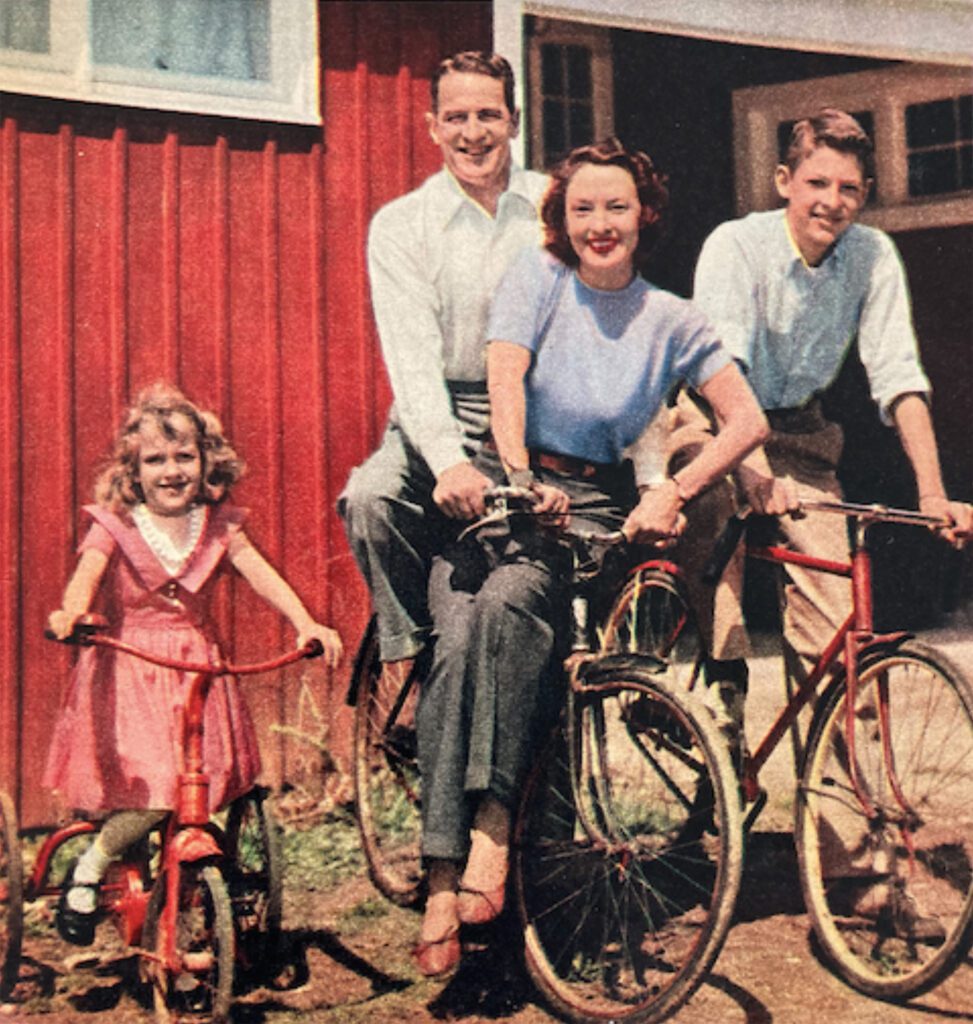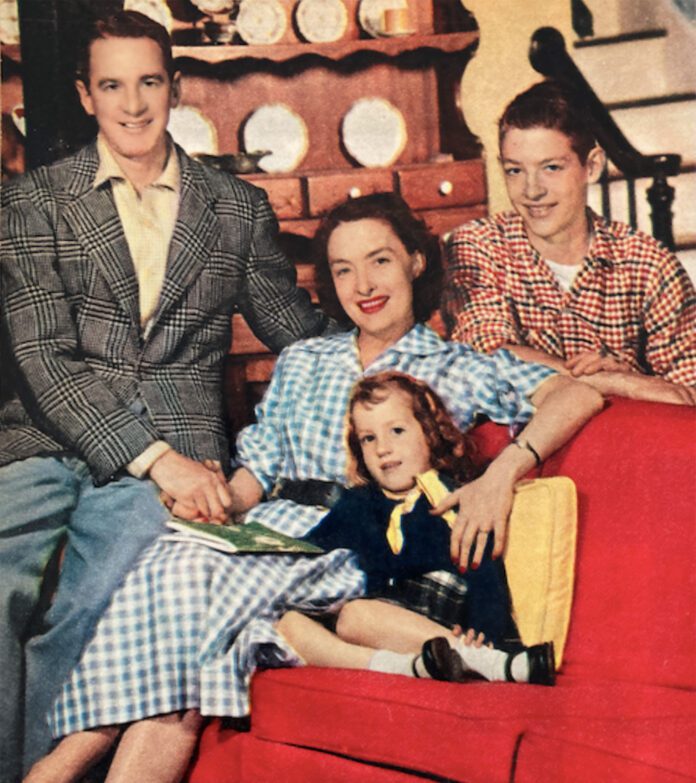If you’re ever in the mood to go looking for television pioneers, you could start right here in our state. Among those who made lasting marks in ’50s TV are Claremore native Patti Page, who had three shows on two different networks through most of that decade, complementing her numerous hit records; Tulsa’s Blake Edwards, who created the archetypal TV private eye, Peter Gunn, in 1958 (and went on to produce and direct a number of major theatrical features); and Oklahoma City’s Molly Bee, a young country-music singer who, in the early ‘50s, parlayed her status as a regular performer on a popular West Coast TV show, Hometown Jamboree, into a national career.
But before any of those folks ambled onto the small screen, there was someone else, a woman who’d left behind her native Nowata (and her subsequent hometowns of Bartlesville and Oklahoma City) for Broadway in the 1930s, where she’d ultimately scored substantial roles in such plays as Many Mansions, Foxhole in the Parlor (which co-starred Montgomery Clift, just prior to the start of his notable film career) and The Curious Savage, in which she shared top billing with famed silent-movie star Lillian Gish. Her name was Flora Campbell, and by 1950, when Curious Savage began its run, she’d also been exploring other forms of entertainment, specifically radio and television, for several years. In fact, she’d played Jo in what has to be the earliest TV adaptation of Little Women, broadcast during the 1939 holiday season, when there were only a few thousand TV sets in the whole country.
But as noteworthy as that appearance is, her status as a true trailblazer came a few years later, when she starred in television’s very first soap opera, Faraway Hill. Debuting on the now-long-defunct DuMont Network on Oct. 2, 1946, this serialized melodrama featured Campbell as a wealthy New Yorker named Karen St. John, who goes to live with relatives in the countryside after her husband’s death. There, she meets a handsome farmer and falls for him, only to find out he’s engaged to her cousin. Uh-oh.

It was the first recurring TV role for Campbell, but not her first soap opera. That particular form of entertainment, featuring a lead female character doing her best to keep things together during an unending barrage of daily challenges, familial and otherwise, had been introduced via radio in the very early 1930s – and had taken off. At that time, housewives made up the soaps’ target audience, so the episodes were generally broadcast on weekday mornings or afternoons, prime listening times for those who did their work at home. The shows were often sponsored by soaps or detergents – which gave the genre its nickname. By the time Faraway Hill came along, Campbell was already a soap-opera veteran, having played lead roles in both NBC Radio’s Brave Tomorrow and CBS Radio’s The Strange Romance of Evelyn Winters.
In addition to appearing on TV rather than radio, Faraway Hill broke some other conventions of the genre. It came on once a week, rather than daily, and it was broadcast in the evening. And while it was the first of its kind to air on television, it didn’t last long, expiring on Dec. 18, 1948. Interestingly enough, Campbell’s Karen St. John, the show’s main character, also died in the final episode, something else that seldom if ever happened in the radio soaps. Then again, there were still only a few thousand TV sets out there to chronicle her demise, as opposed to the millions of radios available to soap-opera listeners.
Unlike her character, Campbell persevered. She continued doing radio, TV and theater work, and by 1954 she was starring in another televised soap, CBS-TV’s Valiant Lady, taking over the title role of Helen Emerson from fellow stage and radio actress Nancy Coleman. That one did considerably better than Faraway Hill, running until late 1957.
An extensive article on Campbell in the August 1955 TV Radio Mirror indicates that Campbell initially had misgivings about playing Valiant Lady’s title character.
“She sounded so ‘noble’ that I was afraid she wouldn’t be a very interesting person,” Campbell told writer Mary Temple. “I was quite wrong about her. Helen Emerson is a warmhearted, delightful human being, a woman I admire and like.”
So did soap opera fans. By the time Campbell took over the role, there were TV sets in more than 60% of American households. Campbell appeared in a good percentage of those homes every weekday, becoming one of television’s earliest stars. In fact, according to newspaper columnist Jane Allison, she was “one of the most popular daytime heroines of all time.”
That writer’s pronouncement came in her July 18, 1957, “Hoosier in Manhattan” column, a feature of Indiana newspapers at the time. It was part of a story about Campbell’s leaving Valiant Lady. Since Campbell had taken on the role, wrote Allison, “[S]he has, in spite of the frantic communications from her fans, managed to be jilted in three most unfortunate romances, has suffered at least one major crisis a week, and many, many minor ones, and has (again with her viewers’ help) lived through a constant procession of nagging worries and fears attendant to the rearing three television children, all distinctly difficult cases.
“Two and a half years of that would tire anyone, whether he took his soap opera life seriously or not. And it has definitely tired Flora Campbell, who has lived Helen Emerson’s life almost as deeply and intensely as her own. When she goes off the air in August, she’s going off to rest, and unless she’s more valiant than she thinks she is at the moment, the next few weeks will be Flora Campbell’s swan song to the role of Helen Emerson.”
Sure enough, Valiant Lady left the air on Aug. 16, 1957, with Helen Emerson finally marrying Governor Lawrence Walker (played by John Graham) who’d been after her for quite some time. The show would not return. And while Flora Campbell could be seen at the movies and on TV in a small handful of supporting roles over the next couple of decades – notably in the long-running daytime soap Love Is A Many Splendored Thing – she appears to have devoted the majority of her time to her husband, Ben Cutler (called in his 2001 New York Times obituary “one of New York’s top four society bandleaders”), their son and daughter, and the remodeled Connecticut farmhouse where they all lived. In her TV Radio Mirror piece, Mary Temple noted that this attention to family was something both the real-life Flora Campbell and her soap opera alter-ego had in common – thanks in great part to Campbell’s Oklahoma upbringing.
“Sharing Helen Emerson’s strong feeling about family ties, Flora Campbell finds her a sympathetic person to play,” Temple wrote. “This feeling, fostered by having a family of her own, was bred in her during her Oklahoma childhood. Although her mother passed on some twenty years ago, she has never forgotten the brave woman who always had such great drive and ambition for her children. Flo says of her, ‘She went out to Oklahoma to teach school, and there she met my father. All her life she was interested in education. She was a Browning scholar, a bird lover who lectured on the subject in our home state and taught others to love them. Even her name was beautiful and unusual – Isis Justice Campbell.’”
Temple went on to note that Campbell’s father (whom sources say was a grocer in Nowata during Campbell’s early years), had retired to Coffeyville, Kansas, to be near a number of family members.
“They see Valiant Lady on television and tell her it’s like getting a letter from her,” wrote Temple. “‘It keeps us close,’ she says.”
On Nov. 6, 1978, Flora Campbell, Nowata-born television pioneer, died in Connecticut at the age of 67.
My thanks to Paul McSpadden for his help with this column.























